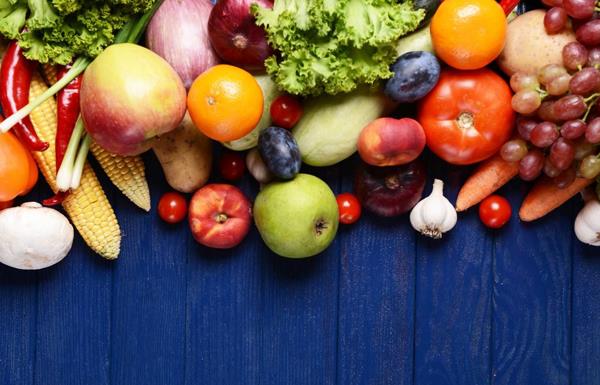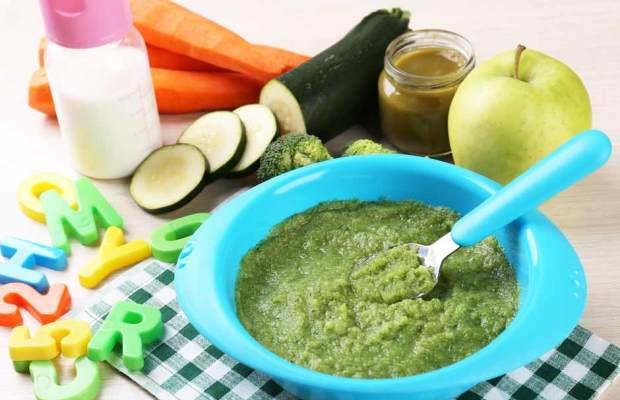In addition to breast milk, babies aged 0-12 months also need nutritional supplements from other food sources. However, what is special in the diet for babies at this age? Refer to the detailed menu right away and the following notes!
For babies and young children, milk is the most important and irreplaceable source of nutrients. The mother should only start the baby to start solids when she sees special signs , or when directed by a health professional.

Instead of imposing, you should listen to me more!
Not to mention daily breastmilk or infant formula, the MarryBaby menu and schedule mentioned below are for reference only to babies aged 0-12 months. Depending on age and growth rate, your baby will probably eat less or more than the recommended standard. So, mothers should feed the baby on demand and should consult more experts, if you feel your baby has a health problem.
1 / Nutrition for children from 0-6 months old
Breast milk is the perfect source of nutrition for babies during this period. However, if there is not enough milk to breastfeed, mothers can incorporate more formulas.
Babies in this age group are often hungry very quickly, so feeding often takes place. Ideally, mothers should breastfeed as soon as the baby needs. Usually, the baby's milk needs each day will fluctuate in the range:
0-3 months: Breastfeeding every 1-3 hours or 550 to 1200ml of formula
4-5 months: Breastfeeding every 2-4 hours or 700 to 1,400ml of formula

Are you ready for your baby's first breastfeed? Belongs to a woman's instinct, but if you want to breastfeed properly and properly the first time, it's not easy at all! Not only does improper breastfeeding make the baby hungry, but the mother is also extremely uncomfortable because of being full of milk
2 / Nutrition for children from 6-8 months old
Just wake up early in the morning: breast milk or formula
Breakfast: breast milk or formula. After that, the mother can feed the baby with more cereals or juice. However, only 1-2 small scoops should be done!
Lunch: Continue to feed your baby with milk first, and add 1-2 tablespoons of cereal flour or 2-4 tablespoons of vegetables or juices.
Dinner: breast milk and / or formula and 1-2 teaspoons of fruit juice or vegetable soup.
For most babies, the daily requirement for milk during this period is usually between: breastfeeding every 3-4 hours or 700 to 1100ml of formula.
Many babies at this stage are not really ready for 3 meals a day until they are 9-10 months old. However, there are also babies who can catch up with this eating rhythm at 7-8 months. So, let's start slowly and prepare a measuring spoon to measure baby food. The first time you get used to the food, maybe the baby can only eat ½ spoon and when the baby gets used to the new food, the mother will increase the amount gradually.

Each baby will have different preferences and development speed. So, instead of giving a framework, mothers should "lean on" according to the habits of the baby
3 / Nutrition for children from 8-12 months old
Early morning just waking up: breast milk and / or formula
Breakfast: Still breastfeed or drink formula. However, during this period, mothers can add the following foods to their baby:
- Children's cereal flour: 1-2 tablespoons
- Juice or tubers: 4-6 tablespoons
Dairy products such as yogurt for example: 2 tablespoons
Lunch: Breastfeed or pre-formula. Then mother can combine with:
- Children's cereal flour or some other cereals such as pasta, rice ...: 2-4 tbsp
Meat or meat protein substitutes: 2-4 tbsp
- Fruit or vegetable juice: 4-6 tablespoons each and can be mixed with baby's cereal. Example: rice mixed with beans and served with pear sauce
- Dairy products: yogurt or cheese
Note to mothers: During lunch, protein protein supplementation from meat can be reduced depending on the preferences and needs of the baby.
Dinner: breast milk or formula. Then, the mother can feed the baby:
- Cereals like pasta, rice ...: 2-4 tbsp
- Meat / meat substitutes: 2 tbsp
- Juices and / or vegetables: 4-6 tablespoons each, used alone or mixed together.
For example: tofu mixed with butter and served with apple and blueberry sauce.
- Dairy products such as yogurt or cheese
Usually, from 5-6 months old, babies will start to eat solids , but with different amounts of food. Some babies 6-7 months can eat 120-180g / day while others can only tolerate 30-60g / day.
Mom can follow the menus suggested above, but it is important to follow the development and eating habits of the baby along with the consultation of the doctor when introducing new foods. Most babies aged 9-12 months will need to breastfeed every 4-5 hours or 700 - 900ml of formula / day.
4 / When will the baby eat enough?
The amount of food each baby can eat depends on many different factors such as:
Babies who eat solids at 4 months will be able to eat more than babies who start solids at 6 months
Babies who are used to chopped foods when they first learn to eat will likely eat less than babies who are given pureed
- How much babies eat, more or less, depends on each baby's appetite. Just like adults, some babies may eat more than their peers just because they are “like to eat”.

For baby food: How much is enough? Putting away the worry of how much breastfeeding is enough, mothers with weaning babies keep spinning, wondering if their babies are well fed. If you have not found the answer for yourself, immediately refer to the following post!















